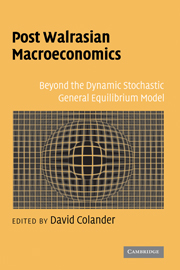Book contents
- Frontmatter
- Contents
- List of Contributors
- Foreword by Alan Kirman
- Introduction
- PART I WHERE WE ARE IN MACRO AND HOW WE GOT THERE
- PART II EDGING AWAY FROM THE DSGE MODEL
- 5 Social Interactions and Macroeconomics
- 6 Macroeconomics and Model Uncertainty
- 7 Restricted Perceptions Equilibria and Learning in Macroeconomics
- 8 Not More So: Some Concepts Outside the DSGE Framework
- PART III LEAPING AWAY FROM THE DSGE MODEL
- PART IV LETTING THE DATA GUIDE THEORY
- PART V POLICY IMPLICATIONS
- Bibliography
- Index
8 - Not More So: Some Concepts Outside the DSGE Framework
Published online by Cambridge University Press: 02 December 2009
- Frontmatter
- Contents
- List of Contributors
- Foreword by Alan Kirman
- Introduction
- PART I WHERE WE ARE IN MACRO AND HOW WE GOT THERE
- PART II EDGING AWAY FROM THE DSGE MODEL
- 5 Social Interactions and Macroeconomics
- 6 Macroeconomics and Model Uncertainty
- 7 Restricted Perceptions Equilibria and Learning in Macroeconomics
- 8 Not More So: Some Concepts Outside the DSGE Framework
- PART III LEAPING AWAY FROM THE DSGE MODEL
- PART IV LETTING THE DATA GUIDE THEORY
- PART V POLICY IMPLICATIONS
- Bibliography
- Index
Summary
The macroeconomic models in the dynamic stochastic general equilibrium (DSGE) framework are certainly an improvement over earlier models, but they are still too simplistic to take seriously as policy advice because they fail to meet Albert Einstein's “Not More So” criterion. In the tradeoff between analytic tractability and relevance to macro problems, they err on the side of tractability. This chapter provides a brief introduction to some analytic tools and techniques that can make macro models more useful by incorporating agent interdependence. These include notions of exchangeability, exchangeable agents, random partitions of sets of agents, distribution of sizes of clusters of agents, and ultrametrics. These tools have been developed outside the economics profession in such disciplines as population genetics, combinatorial stochastic processes, and statistical physics, as they have struggled to deal with problems with structures similar to those with which macroeconomists are struggling, and they are important building blocks of what is being called Post Walrasian macroeconomics.
Specifically, I discuss tools that allow one to go beyond two assumptions that characterize almost all DSGE models: (1) the two clusters of agents in fixed proportions assumptions, replacing them with general random partitions and random clusters of agents of various sizes; and (2) the uniform arrangement of agents on a unit interval assumption, replacing it with ultrametric distances between clusters.
Ultrametric distances allow one to express relations among clusters of agents (firms or sectors) rather than simply among agents.
Information
- Type
- Chapter
- Information
- Post Walrasian MacroeconomicsBeyond the Dynamic Stochastic General Equilibrium Model, pp. 161 - 172Publisher: Cambridge University PressPrint publication year: 2006
Accessibility standard: Unknown
- 3
- Cited by
